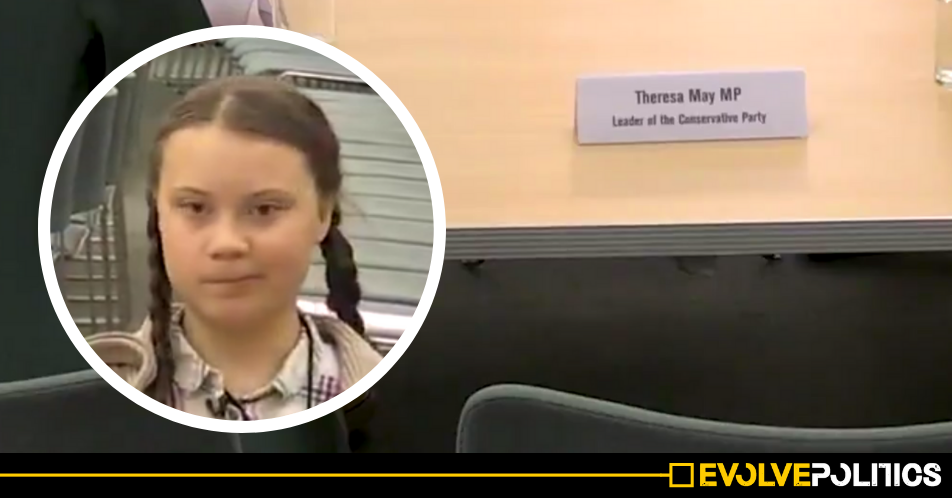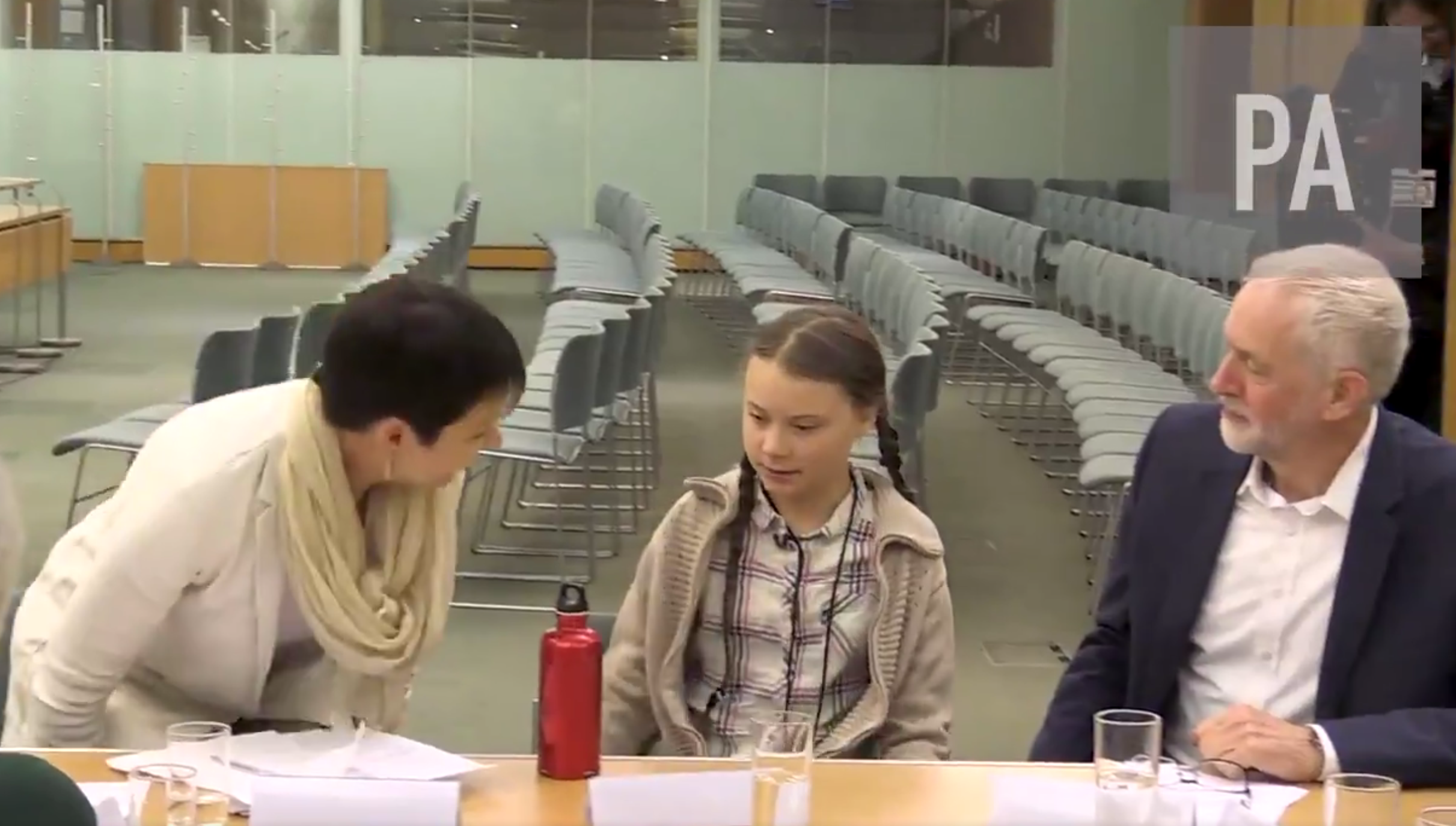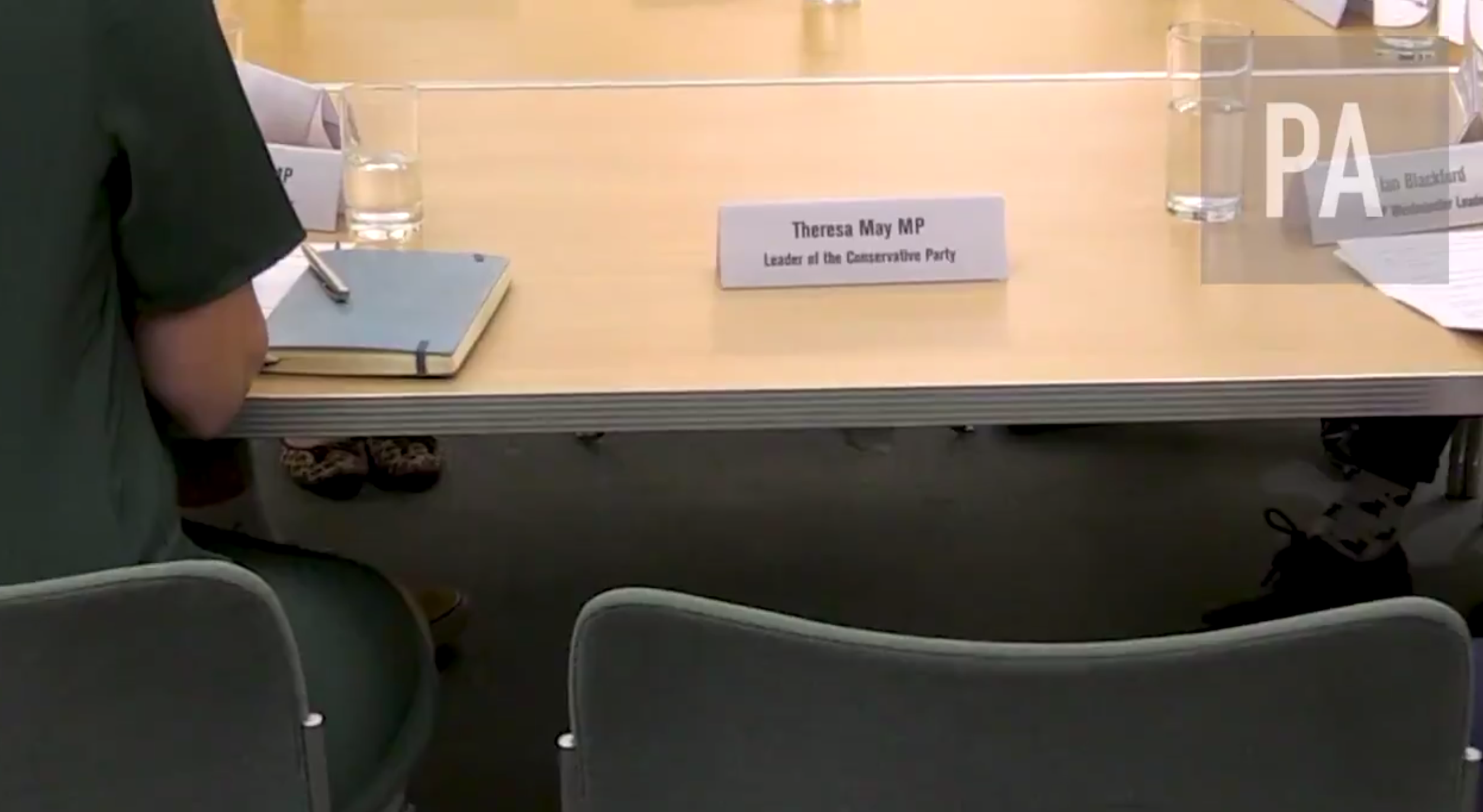The Prime Minister Theresa May has ignored an invitation to speak with Greta Thunberg at a specially arranged meeting between the teenage environmental activist and leaders of the UK’s main political parties in Parliament today – with the PM’s vacant chair and nametag providing a highly apt metaphor for the government’s continued ignorance over increasing public concern around climate change.
At the meeting in Parliament, Greta Thunberg – the increasingly well-known environmental activist who addressed the Extinction Rebellion protests in London over the weekend – met the Labour leader, Jeremy Corbyn, the leader of the Liberal Democrats, Vince Cable, the Westminster leaders of the SNP and Plaid Cymru, Ian Blackford and Liz Saville Roberts, and the Green Party’s sole MP, Caroline Lucas.
However, a place which had been specially reserved for the Prime Minister and was left glaringly empty.
According to The Guardian, Theresa May’s spokesman said that Downing Street ‘did not have information about whether the prime minister had been invited to see Thunberg.‘
However, organisers of the event stated that the Prime Minister had been formally invited, but had ignored the request for her to attend.
At the meeting, Labour leader Jeremy Corbyn thanked Thunberg for her work highlighting the increasingly desperate need to tackle climate change, telling her “Well done for what you have done“, whilst Caroline Lucas said:
“I think all of us are really committed to trying to ensure that there’s an ongoing way to really make sure that all of our policies and all of our work in parliament is properly scrutinised by young people with a perspective on climate in particular.
“We want young people’s voices to be heard in parliament. This is such an important moment, when the Intergovernmental Panel on Climate Change say we have just 11 years left to get off the collision course we are on for climate catastrophe.
“That sense of urgency is here as never before, at a time when there have been protests on the streets not just of London but around the country and all the different nations of the UK. More than ever, politicians have our ears open to your message.”
https://twitter.com/RupertMyers/status/1120673167650037760
Following the meeting, Thunberg also met the Speaker of the House, John Bercow, as well as former Labour leader Ed Miliband and the Liberal Democrat MP, Layla Moran.
Whilst the PM’s aides have attempted to pass off Mrs May’s absence as a simple administration error, her extraordinarily bleak voting record on environmental issues would surely have been highlighted at the meeting.
Mrs May has repeatedly voted against measures to prevent climate change, including:
- Voting against requiring a strategy for carbon capture and storage for the energy industry.
- Voting against setting a decarbonisation target for the UK within six months of June 2016 and to review it annually thereafter.
- Voting against the setting of a target range for the amount of carbon dioxide (or other greenhouse gases) produced per unit of electricity generated.
- Voting against the requirement of environmental permits for hydraulic fracturing (fracking) activities.
- Voting against a ban on the exploitation of unconventional petroleum for at least 18 months and against a review of the impact of such exploitation on climate change, the environment, the economy, and health and safety be carried out and published.
- Voting in favour of selling off England’s public forest estate to private corporations.
Despite Mrs May’s absence, Thunberg slammed the UK’s Conservative government, calling their support for fossil fuels and airport expansion as “beyond absurd“, adding:
“This ongoing irresponsible behaviour will no doubt be remembered in history as one of the greatest failures of humankind.”
You can read Thunberg’s full speech to MPs below:
My name is Greta Thunberg. I am 16 years old. I come from Sweden. And I speak on behalf of future generations.
I know many of you don’t want to listen to us – you say we are just children. But we’re only repeating the message of the united climate science.
Many of you appear concerned that we are wasting valuable lesson time, but I assure you we will go back to school the moment you start listening to science and give us a future. Is that really too much to ask?
In the year 2030 I will be 26 years old. My little sister Beata will be 23. Just like many of your own children or grandchildren. That is a great age, we have been told. When you have all of your life ahead of you. But I am not so sure it will be that great for us.
I was fortunate to be born in a time and place where everyone told us to dream big; I could become whatever I wanted to. I could live wherever I wanted to. People like me had everything we needed and more. Things our grandparents could not even dream of. We had everything we could ever wish for and yet now we may have nothing.Now we probably don’t even have a future any more.
Because that future was sold so that a small number of people could make unimaginable amounts of money. It was stolen from us every time you said that the sky was the limit, and that you only live once.
You lied to us. You gave us false hope. You told us that the future was something to look forward to. And the saddest thing is that most children are not even aware of the fate that awaits us. We will not understand it until it’s too late. And yet we are the lucky ones. Those who will be affected the hardest are already suffering the consequences. But their voices are not heard.
Is my microphone on? Can you hear me?
Around the year 2030, 10 years 252 days and 10 hours away from now, we will be in a position where we set off an irreversible chain reaction beyond human control, that will most likely lead to the end of our civilisation as we know it. That is unless in that time, permanent and unprecedented changes in all aspects of society have taken place, including a reduction of CO2 emissions by at least 50%.
And please note that these calculations are depending on inventions that have not yet been invented at scale, inventions that are supposed to clear the atmosphere of astronomical amounts of carbon dioxide.
Furthermore, these calculations do not include unforeseen tipping points and feedback loops like the extremely powerful methane gas escaping from rapidly thawing arctic permafrost.
Nor do these scientific calculations include already locked-in warming hidden by toxic air pollution. Nor the aspect of equity – or climate justice – clearly stated throughout the Paris agreement, which is absolutely necessary to make it work on a global scale.
We must also bear in mind that these are just calculations. Estimations. That means that these “points of no return” may occur a bit sooner or later than 2030. No one can know for sure. We can, however, be certain that they will occur approximately in these timeframes, because these calculations are not opinions or wild guesses.
These projections are backed up by scientific facts, concluded by all nations through the IPCC. Nearly every single major national scientific body around the world unreservedly supports the work and findings of the IPCC.
Did you hear what I just said? Is my English OK? Is the microphone on? Because I’m beginning to wonder.
During the last six months I have travelled around Europe for hundreds of hours in trains, electric cars and buses, repeating these life-changing words over and over again. But no one seems to be talking about it, and nothing has changed. In fact, the emissions are still rising.
When I have been travelling around to speak in different countries, I am always offered help to write about the specific climate policies in specific countries. But that is not really necessary. Because the basic problem is the same everywhere. And the basic problem is that basically nothing is being done to halt – or even slow – climate and ecological breakdown, despite all the beautiful words and promises.
The UK is, however, very special. Not only for its mind-blowing historical carbon debt, but also for its current, very creative, carbon accounting.
Since 1990 the UK has achieved a 37% reduction of its territorial CO2 emissions, according to the Global Carbon Project. And that does sound very impressive. But these numbers do not include emissions from aviation, shipping and those associated with imports and exports. If these numbers are included the reduction is around 10% since 1990 – or an an average of 0.4% a year, according to Tyndall Manchester.
And the main reason for this reduction is not a consequence of climate policies, but rather a 2001 EU directive on air quality that essentially forced the UK to close down its very old and extremely dirty coal power plants and replace them with less dirty gas power stations. And switching from one disastrous energy source to a slightly less disastrous one will of course result in a lowering of emissions.
But perhaps the most dangerous misconception about the climate crisis is that we have to “lower” our emissions. Because that is far from enough. Our emissions have to stop if we are to stay below 1.5-2C of warming. The “lowering of emissions” is of course necessary but it is only the beginning of a fast process that must lead to a stop within a couple of decades, or less. And by “stop” I mean net zero – and then quickly on to negative figures. That rules out most of today’s politics.
The fact that we are speaking of “lowering” instead of “stopping” emissions is perhaps the greatest force behind the continuing business as usual. The UK’s active current support of new exploitation of fossil fuels – for example, the UK shale gas fracking industry, the expansion of its North Sea oil and gas fields, the expansion of airports as well as the planning permission for a brand new coal mine – is beyond absurd.
This ongoing irresponsible behaviour will no doubt be remembered in history as one of the greatest failures of humankind.
People always tell me and the other millions of school strikers that we should be proud of ourselves for what we have accomplished. But the only thing that we need to look at is the emission curve. And I’m sorry, but it’s still rising. That curve is the only thing we should look at.
Every time we make a decision we should ask ourselves; how will this decision affect that curve? We should no longer measure our wealth and success in the graph that shows economic growth, but in the curve that shows the emissions of greenhouse gases. We should no longer only ask: “Have we got enough money to go through with this?” but also: “Have we got enough of the carbon budget to spare to go through with this?” That should and must become the centre of our new currency.
Many people say that we don’t have any solutions to the climate crisis. And they are right. Because how could we? How do you “solve” the greatest crisis that humanity has ever faced? How do you “solve” a war? How do you “solve” going to the moon for the first time? How do you “solve” inventing new inventions?
The climate crisis is both the easiest and the hardest issue we have ever faced. The easiest because we know what we must do. We must stop the emissions of greenhouse gases. The hardest because our current economics are still totally dependent on burning fossil fuels, and thereby destroying ecosystems in order to create everlasting economic growth.
“So, exactly how do we solve that?” you ask us – the schoolchildren striking for the climate.
And we say: “No one knows for sure. But we have to stop burning fossil fuels and restore nature and many other things that we may not have quite figured out yet.”
Then you say: “That’s not an answer!”
So we say: “We have to start treating the crisis like a crisis – and act even if we don’t have all the solutions.”
“That’s still not an answer,” you say.
Then we start talking about circular economy and rewilding nature and the need for a just transition. Then you don’t understand what we are talking about.
We say that all those solutions needed are not known to anyone and therefore we must unite behind the science and find them together along the way. But you do not listen to that. Because those answers are for solving a crisis that most of you don’t even fully understand. Or don’t want to understand.
You don’t listen to the science because you are only interested in solutions that will enable you to carry on like before. Like now. And those answers don’t exist any more. Because you did not act in time.
Avoiding climate breakdown will require cathedral thinking. We must lay the foundation while we may not know exactly how to build the ceiling.
Sometimes we just simply have to find a way. The moment we decide to fulfil something, we can do anything. And I’m sure that the moment we start behaving as if we were in an emergency, we can avoid climate and ecological catastrophe. Humans are very adaptable: we can still fix this. But the opportunity to do so will not last for long. We must start today. We have no more excuses.
We children are not sacrificing our education and our childhood for you to tell us what you consider is politically possible in the society that you have created. We have not taken to the streets for you to take selfies with us, and tell us that you really admire what we do.
We children are doing this to wake the adults up. We children are doing this for you to put your differences aside and start acting as you would in a crisis. We children are doing this because we want our hopes and dreams back.
I hope my microphone was on. I hope you could all hear me.



